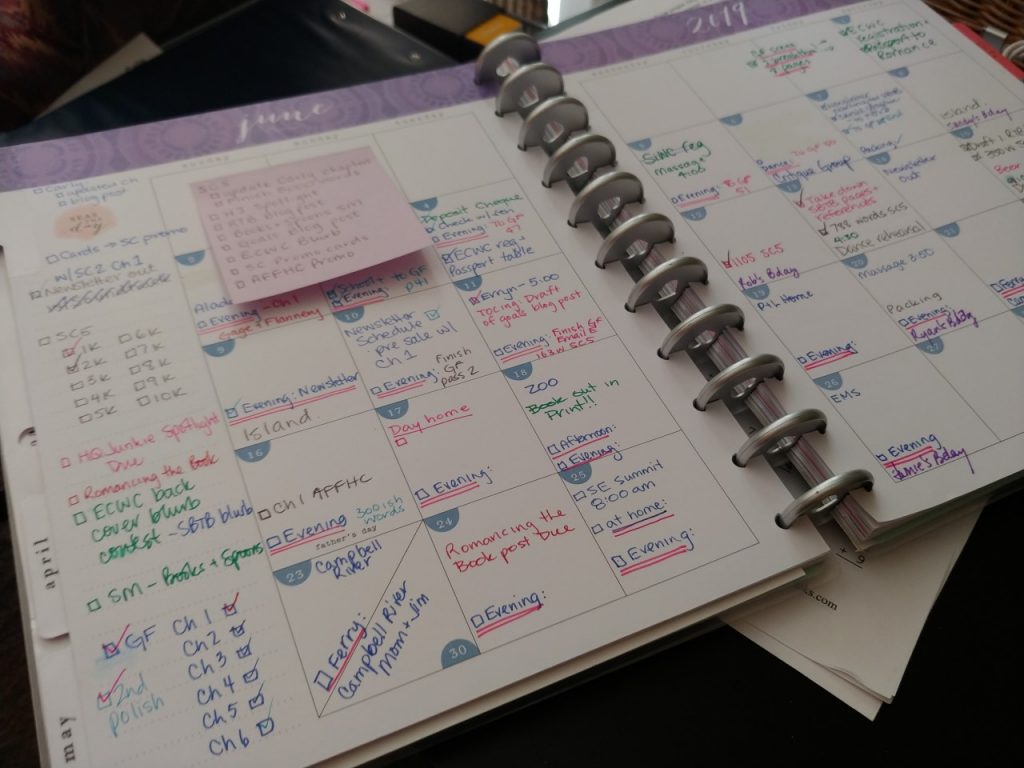We’re delighted to repost this valuable writing advice from Laurel Greer, courtesy of our archives. Previously posted in June 2019.
A little while ago, I was reading a post on the Harlequin Writing Community Facebook page, and one of the posters commented that she would never be able to reach the same monthly word-count target that someone else had set for herself. The writer with a smaller capacity sounded so defeated. I wanted to climb through the Facebook page, take her out for tea, and tell her the following: you know what? You probably can’t meet that target. And more importantly? That’s OKAY. We all write at varying speeds and have different amounts of available time, money, wellness, and skill, each of which affects our output. A realistic goal for some is completely unrealistic (and therefore, self-defeating) for others. And we don’t want to defeat ourselves! We want to keep writing, at a pace that works for us. For me, this has meant implementing five strategies while goal setting.
1. Create SMART goals. They’re common in the business and education worlds, but if you haven’t thought about how to implement SMART goals for your writing, I highly recommend doing so. The acronym stands for Specific, Measurable, Achievable, Relevant (or Realistic), and Time-based. Each goal a writer sets will be easier to check off the to-do list if it is SMART. For anyone needing more information on SMART, mindtools.com has a good resource detailing each step. YouTube also has a number of videos.

2. Visuals. Be it a digital calendar, a tracker on the bottom of a writing program, or a paper planner, visually keeping track of progress makes it easier to know if goals are being met. I recommend tracking time spent and the activities completed within that time. If I don’t complete a goal (which is part of life – it happens), having that data helps to understand why. Writing down what I accomplished and when is invaluable for learning how much I can actually get written in a month, or how much time the other parts of writing—synopses, proposals, promotions, social media, marketing, submitting—actually take. I’ve tried numerous ways to keep track, and settled on a monthly calendar with a to-do list on the side. It took trying different methods, but it was worth it in order to juggle my day job (I’m a high-school teacher), my family and personal life, my contracted writing, and the projects I’m in the process of submitting.

3. Know your weak spots. Personally, I struggle with Realistic. It’s very easy to look at best-selling authors and feel defeated for not being on a list. It took some great advice from Dani Collins about slowly building a readership and career to learn that I couldn’t do it all at once. So I worked on making my goals more realistic: being honest with myself about how many words I could write in a month and to work with that rather than be anxious about not doing enough. For those who struggle with the elusive THE END, realistic might be to finish a book before worrying about submitting. Or for some who got to THE END and submitted and now have an inbox of rejection letters asking for deeper conflict (leaning heavy on the autobiographical experience, here), realistic might be listening to podcasts, attending a conference, or working with a critique group to deepen craft knowledge and revision techniques.

4. Being flexible. Some SMART proponents make the acronym SMARTER, adding in Evaluated and Reviewed. Before I set my goals for the upcoming month, I do an inventory of my previous month’s goals—what did I manage to finish, and if not, why? Was it a time issue? Did something come up in my personal life, or at my day job? Did my editor send me revisions that had to be completed ASAP? These things happen. Life gets in the way of even the most realistic of goals. And sometimes the lulls stretch for much longer than a month. Many authors have to re-evaluate when health concerns arise. Personally, I stopped writing for the four and a half years between getting pregnant with my first daughter and when I stopped breastfeeding my second. My brain lost the ability to form sentences. And I stressed about it. I figured editors would see that gap and doubt my ability to finish a book and be serious about a career. I was wrong. Once I got out of mom-fog and determined I had the ability to finish a book again, I revised and sold a book I had written before I had kids (From Exes to Expecting) and then signed on for five more Special Editions. It required some faith in myself and some heavy reliance on that day planner I mentioned, but it happened, despite what felt like a long stretch of no writing.

5. Prioritize balance. We’re all managing some combination of writing, day jobs, partners, children, extended families, pets, hobbies, self-care, and more. But if we stretch ourselves too far, cutting too much time away from connecting with others, being kind to our bodies, and filling our creative wells, everything suffers. We have to honestly assess how much time in a given day, week, and month can be devoted to writing. Some days, it might be none. (Which is fine—”write every day” does not work for all authors.) Block off time for the things that must get done (including self-care!), and with the time that is set aside for writing, decide how that is best spent. Sometimes it means finishing one project before following a plot bunny. Sometimes it means slowing down and prioritizing health. But achieving goals, however small or large, will build your career. Little steps can eventually lead to a heck of a view.

Do you have any goal-setting strategies that work for you? Share in the comments!
Be on the lookout for Laurel Greer’s new novel, Their Nine-Month Surprise, available now from Harlequin Special Edition!




